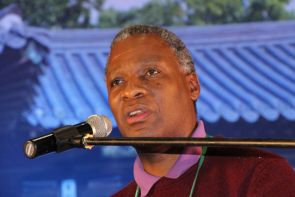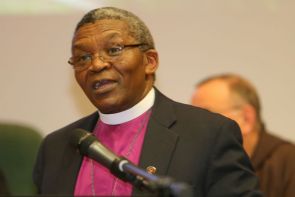Faith leaders hold local Black Lives Matter vigil in South Africa to protest lockdown deaths

Faith leaders in South Africa held a Sunday gathering in a local Black Lives Matter silent vigil demonstrations in the cities of Cape Town and Pretoria.
They prayed in solidarity with those who have died at the hands of law enforcement officers during lockdowns in South Africa and abroad.
"We are gathered here because Black Lives Matter, whether in South Africa, the United States, France, Australia or elsewhere," Cape Town's Anglican Archbishop Thabo Makgoba told faith leaders at St. George's Cathedral.
The steps of St. George's were the venue of many protests against the last century's apartheid regime.
"Our prayers here today have been for Collins Khoza and all those he represents in South Africa who have been killed by forces deployed by the State to enforce lockdown regulations."
"They have been for George Floyd and all those he represents in the United States, for Adama Traore and all those he represents in France, and for David Dungay, an indigenous Australian who died saying; 'I can't breathe,' and all those he represented," said the archbishop.
"We are shocked at the way in which the SA National Defence Force, with the most rudimentary, inadequate reasoning imaginable, has exonerated its soldiers of any culpability in Mr. Khosa's death, and at the repudiation of their minister's statement that the matter has not been finalized.
BUFFALO POLICE
"We are shocked at the blatant disrespect for law and order shown by members of the Buffalo, New York police squad, 57 of whom resigned from their unit not because two of their number were implicating in assaulting a 75-year-old man, inflicting head injuries, but because the two were suspended," said Makgoba.

He said, "We are here because we are tired....sick to death....exhausted... at the seemingly never-ending struggle that people of color still face, well into the 21st century, 50 years after the American civil rights struggle, 25 years after the end of political apartheid, to be treated equally by arms of the State.
"We are here because we protest against the wanton, unnecessary use of violence by police and soldiers who break the laws they are entrusted to uphold and assault protestors of whatever race who declare that Black Lives Matter."
Weekend protests erupted in cities around the world, such as Athens, Berlin, Cape Town, London, Paris, Brussels, Rotterdam, Sydney, and in the United States, to support the Black Lives Matter movement.
They began as protests for the killing of George Floyd, an unarmed black man who died after being pinned down by a white police officer in the US state of Minnesota.
Interfaith leaders in Cape Town gathered for an hour outside on the steps of St. George's Cathedral where Makgoba delivered a message on behalf of all the clerics.
He said he was shocked at the number of people who have died at the hands of law enforcement officers during South Africa's lockdown, reported as one of the most stringent imposed worldwide.
"In our own backyards, at least 12 people are reported to have died at the hands of the police and army troops. We recognize that investigations are still ongoing, but we are deeply concerned that the plight of our sisters and brothers is going unnoticed and forgotten," said Makgoba.
The Pretoria vigil at the St. Alban's Cathedral was organized by the South African Council of Churches.
"Our intention is that this silent vigil will be a clear expression of our disdain for the current brutality exhibited by our police and defence forces and to call for greater accountability and justice for these families," the SACC's general-secretary, Bishop Malusi Mpumlwana, said in a statement.
CIGARETTE AND ALOCHOL SALES BANNED
South Africa's lockdown regulations restricted and heavily controlled movement between provinces and banned the sale of alcohol and cigarettes.
South African media reported that 12 people are know to have died following police or army brutality since the lockdown began.
"Our prayers here today have been for Collins Khoza and all those he represents in South Africa who have been killed by forces deployed by the State to enforce lockdown regulations," Makgoba said before honoring each of the 12 people who had died. He read their names before a moment of silence.

On April 10, soldiers had assaulted Collins Khoza in his home in Alexandra township, a poor area inhabited by black people in Johannesburg.
During the operation enforcing lockdown, Khoza was allegedly beaten to death in his own home by soldiers, after beer was found in his yard. He has become the George Floyd symbol of lockdown deaths in South Africa, causing an outcry in civil society.
Although the High Court in Pretoria found last month that the conduct of South African National Defence Force members implicated in Collins Khosa's killing was in violation of human rights, an internal SANDF inquiry exonerated them last week.
"Our prayers here today have been for Collins Khoza and all those he represents in South Africa who have been killed by forces deployed by the State to enforce lockdown regulations.
"They have been for George Floyd and all those he represents in the United States, for Adama Traore and all those he represents in France, and for David Dungay, an indigenous Australian who died saying "I can't breathe", and all those he represented," the archbishop said.
Makgoba said it is shocking that soldiers implicated have been exonerated in any "culpability in Mr. Khosa's death."
He condemned the police and army for ignoring South African President Cyril Ramaphosa's plea to protect communities during lockdown and not use excessive force.
Bishop Mpumlwana said "It feels like we've been here before, yes, in apartheid days; or in George Floyd's Minneapolis! What a week to announce this 'No One to Blame' verdict."
